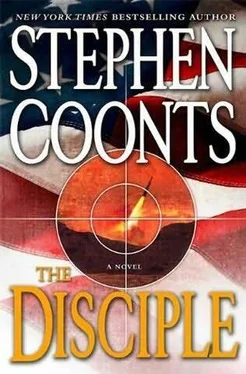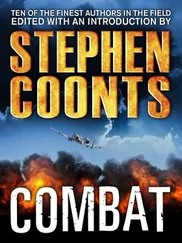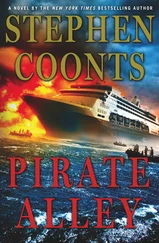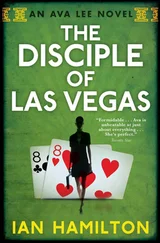Stephen Coonts - The Disciple
Здесь есть возможность читать онлайн «Stephen Coonts - The Disciple» весь текст электронной книги совершенно бесплатно (целиком полную версию без сокращений). В некоторых случаях можно слушать аудио, скачать через торрент в формате fb2 и присутствует краткое содержание. Жанр: Триллер, на английском языке. Описание произведения, (предисловие) а так же отзывы посетителей доступны на портале библиотеки ЛибКат.
- Название:The Disciple
- Автор:
- Жанр:
- Год:неизвестен
- ISBN:нет данных
- Рейтинг книги:4 / 5. Голосов: 1
-
Избранное:Добавить в избранное
- Отзывы:
-
Ваша оценка:
- 80
- 1
- 2
- 3
- 4
- 5
The Disciple: краткое содержание, описание и аннотация
Предлагаем к чтению аннотацию, описание, краткое содержание или предисловие (зависит от того, что написал сам автор книги «The Disciple»). Если вы не нашли необходимую информацию о книге — напишите в комментариях, мы постараемся отыскать её.
The Disciple — читать онлайн бесплатно полную книгу (весь текст) целиком
Ниже представлен текст книги, разбитый по страницам. Система сохранения места последней прочитанной страницы, позволяет с удобством читать онлайн бесплатно книгу «The Disciple», без необходимости каждый раз заново искать на чём Вы остановились. Поставьте закладку, и сможете в любой момент перейти на страницу, на которой закончили чтение.
Интервал:
Закладка:

Stephen Coonts
The Disciple
The fourth book in the Tommy Carmellini series, 2009
To Deborah
God willing, with the force of God behind it, we shall soon experience a world without the United States and Zionism.
– Mahmoud Ahmadinejad
CHAPTER ONE
MAY: SYRIA
The dark green bombs fell from a milky sky. There were six of them, weighing a ton apiece. They had been dropped from an altitude of about twenty-six thousand feet, so the fall was going to take a while.
On the ground, Mikhail Toporov heard the distant, fading thunder of the three warplanes. Although he didn’t know it, they were Israeli F-15s. He scanned the sky. The visibility was excellent in the dry air under a high cirrus layer, which made the sky look a dirty white. Toporov saw nothing. If he had looked harder, he would have seen the aircraft as black dots against the white clouds, but his eyes were not focused for really distant objects. Even as he looked, the falling bombs were accelerating to terminal velocity.
Mikhail Toporov was offended by the airplane noise. There should be no aircraft at all in this prohibited zone.
Toporov flipped away his cigarette and walked quickly back into the air defense command and control bunker. Meanwhile the GPS modules on the tails of the bombs located their satellites and began issuing steering commands to canards that protruded from modules screwed into the noses of the weapons. Each bomb steered toward its designated target.
As the warplanes completed their postrelease turns and steadied out on course for home base, Mikhail Toporov leaned over the shoulder of one of his Russian colleagues seated at a radar console and looked at the display. The radar was sweeping… and there were no returns.
“Select the local area display,” Toporov said.
“That is the local area display.”
It didn’t compute. Toporov had just heard the planes. “Select fifty kilometers,” he said.
A flip of a switch, and still the scope was empty.
“Something is wrong,” Toporov said, his mind racing.
Now only three miles above him, the bombs plummeted down.
Inside the administration building for the Syrian nuclear reactor, which was just next door, less than fifty yards away, Dr. Raza Qureshi was eating lunch at his desk while he scrutinized the latest draft of the government’s Top Secret plan to stockpile enriched uranium for future nuclear warheads. He had written the plan upon direction from Damascus; it was almost ready to be signed and forwarded to the ministry.
Dr. Qureshi gave little thought to the political implications of the plan-he was concerned with the technical aspects. Still, he knew that Syria and her allies in the Middle East had many formidable enemies, with the most formidable, Israel, not very far away. It was his belief that the national leaders were prudent and correct to plan for the future.
He used his fingers to select a piece of cold meat as he scanned the text. He was a compulsive editor, one who was never satisfied, even with his own words, and now he saw a word that perhaps should be changed. He abandoned the food plate in midgrope. He drew a careful line through the offending word and wrote the one he wanted immediately above it.
That done, he laid down the pen and checked his watch. He had another half hour before he needed to go to the control room.
Qureshi reached again for the food plate and resumed reading.
There were seventeen people in the reactor control room. A dozen technicians monitored dials and gauges and made meticulous notes in logbooks. Behind them, four electricians were trying to find the fault in a relay panel, which seemed to have developed a short. They had the front of the panel off and were working with voltage meters.
The technicians were engrossed in their work. The reactor had been down for a month for maintenance, and they were engaged in the prestart checks. They were almost finished. Just now they were pulling the rods from the pile one at a time, then reinserting each one, checking to ensure that they had complete control of every rod. So far, everything was working just as it should, praise Allah, but Dr. Qureshi was a demanding taskmaster who insisted on no shortcuts. Intently focused, they continued their work.
A man from the ministry in Damascus was watching and taking notes. He spoke to no one, asked no questions. Even though this was his very first visit to the reactor, he acted as if he knew everything, so there was nothing to ask; most of the people in the room suspected that he asked no questions because he was afraid to reveal the depths of his ignorance. In their experience, political people rarely knew anything about the reactor or how it worked. This one, they had concluded hours earlier, was like all the others.
Seventeen people, all of whom had only seconds more to live as the bombs fell toward the earth, toward the reactor, toward them.
An F-15 and two F-16s banked into a lazy right-hand circle around the reactor, twenty-two thousand feet above the ground, still well under the cirrus layer.
The reactor off their right wings had been constructed under a large pitched roof, which resembled that of a barn, or even an old factory. The roof was there to hide the reactor from satellites and aerial reconnaissance. A half mile to the northeast of the building was the Euphrates River, a broad, brown, placid, meandering highway that stretched to the horizon. The reactor had been under construction for six years, so the disturbed area above the ditches in which the water pipes were buried that carried river water to and from the reactor were no longer discernible from this altitude.
The single-piloted F-16s were merely escorts for the F-15, which had a two-man crew. The man in the rear seat of the F-15 Eagle centered his handheld camera on the roof of the reactor. Fortunately, the visibility was excellent today. The camera was a digital one with a long lens, one designed to take five photos a second automatically if the shutter button was depressed and held down. The pilot in the front seat was counting down the seconds. “Six… five… four…”
At four, the cameraman depressed the shutter button and held it down. He concentrated on holding the camera steady and keeping the reactor centered in the viewfinder.
In the antiaircraft defense control center, Mikhail Toporov was still baffled. Something was wrong-he had heard jet engines, and there should be no aircraft in the prohibited zone, none whatsoever. He reached down beside the man at the scope and pushed the red alert button on his console. Instantly a siren sounded in the control room.
A siren also sounded in the reactor administration building. Startled, Dr. Qureshi looked up, just in time to see his secretary walking into his office. That was the last thing he saw as the first bomb penetrated the roof of the building, plunged through all five floors and detonated in the basement of the structure. The floors heaved before they buckled. The desk on which he had been working was flung upward and struck Dr. Qureshi in the head, knocking him unconscious. He was killed when the building collapsed around him.
In the reactor control room, a siren also went off. Shocked, the technicians stared at the gauges in front of them, trying to understand. The reactor was cold, so this couldn’t be the nuclear alarm.
Even as they realized it was an air raid alert alarm, the bombs smashed into the roof of the reactor and penetrated deeply, one at a time, two-tenths of a second apart. The bomb fuses were set to explode before the weapons penetrated all the way through the structure into the earth; they actually exploded just above the massive concrete floor that formed the support for the reactor. The trip-hammer explosions-a total of five tons of high explosive-destroyed the pile, destroyed the coolant pipes and pumping systems and rods and rod machinery and the hydraulic systems that controlled them, destroyed the walls and machinery and ceiling, reduced everything to molten rubble. The explosions were so hot that steel and concrete ignited.
Читать дальшеИнтервал:
Закладка:
Похожие книги на «The Disciple»
Представляем Вашему вниманию похожие книги на «The Disciple» списком для выбора. Мы отобрали схожую по названию и смыслу литературу в надежде предоставить читателям больше вариантов отыскать новые, интересные, ещё непрочитанные произведения.
Обсуждение, отзывы о книге «The Disciple» и просто собственные мнения читателей. Оставьте ваши комментарии, напишите, что Вы думаете о произведении, его смысле или главных героях. Укажите что конкретно понравилось, а что нет, и почему Вы так считаете.












